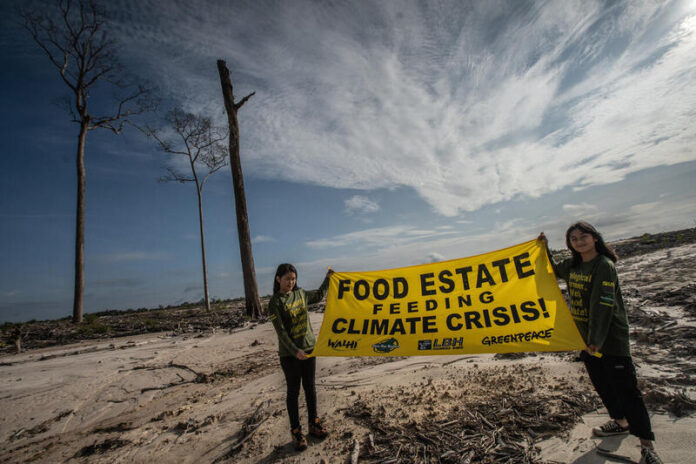Central Kalimantan, Indonesia, 10 November 2022 – Indonesian activists unfurled a giant banner reading ‘Food Estate Feeding Climate Crisis’ at Gunung Mas, Kalimantan, to protest the clearing of forested Indigenous Land in Indonesia for industrial agriculture and to send a message to delegates at COP27 in Sharm el-Sheikh, Egypt to protect the forests.
Greenpeace Indonesia’s Feeding the Climate Crisis report, released today, warns of a vast land grab for a new food estate program, threatening Indigenous territory and crucial biodiversity in Indonesia. This may include up to 3.2 million hectares of land in Papua.
The report found that the food estate program, which was announced as a response to food supply concerns at the start of the COVID-19 pandemic, will not improve food security but will instead exacerbate the climate and biodiversity crises through exploiting forests and peatland. Greenpeace Indonesia’s report highlights available alternatives capable of nourishing Indonesian households without destroying forests and cooking the climate.
Syahrul Fitra, Greenpeace Indonesia senior forest campaigner, said from the protest location in Gunung Mas, Central Kalimantan:
“This cassava plantation in Gunung Mas is just one of a number of areas being converted to large-scale agriculture by the government under its food estate program. This approach is not only failing to produce the promised cassava, but it will never produce a diverse, nutritious and culturally appropriate diet. There are better ways – with ecological farming and traditional agroforestry we can feed the world and cool the planet.”
Muhamad Habibi, Director of Save Our Borneo, said:
“This forest was a pantry, but now the pantry is bare. The Indigenous Dayak here in Gunung Mas have used this landscape sustainably for millenia to produce and collect food sustainably. It is also a store of irreplaceable biodiversity, including habitat for the Bornean Orangutan. Now the Ministry of Defence has barged in with soldiers and cleared the forest for their disastrous monoculture food estate program.”
Yeb Saño, Greenpeace’s COP27 Head of Delegation, said:
“Our industrial approach to agriculture is the biggest cause of biodiversity loss and responsible for a third of climate-wrecking GHG emissions. It is also self-defeating: the 2022 UN Food Security report tells us global food insecurity is being driven by climate extremes. So, we face not only a food crisis, but an existential crisis arising from our failure to protect nature. We know the two are inextricably linked. We cannot solve one without dealing with the other.
Fortunately we can break this vicious circle by returning to and learning from the natural food systems of Indigenous peoples and local production by small scale farming communities. By pursuing an agroecology approach, we can preserve nature and our food systems can gain the resilience we need in order to mitigate the impact of climate change.”
ENDS
Photos and videos of the protest by activists from Greenpeace Indonesia, LBH Palangkaraya, Save Our Borneo, and WALHI Central Kalimantan, available from the Greenpeace Media Library.
Contact
Igor O’Neill, Greenpeace Indonesia Forests Campaign. [email protected] +61-414-288-424
Gaby Flores, Communications Coordinator, Greenpeace International, [email protected] , +1 214 454 3871



